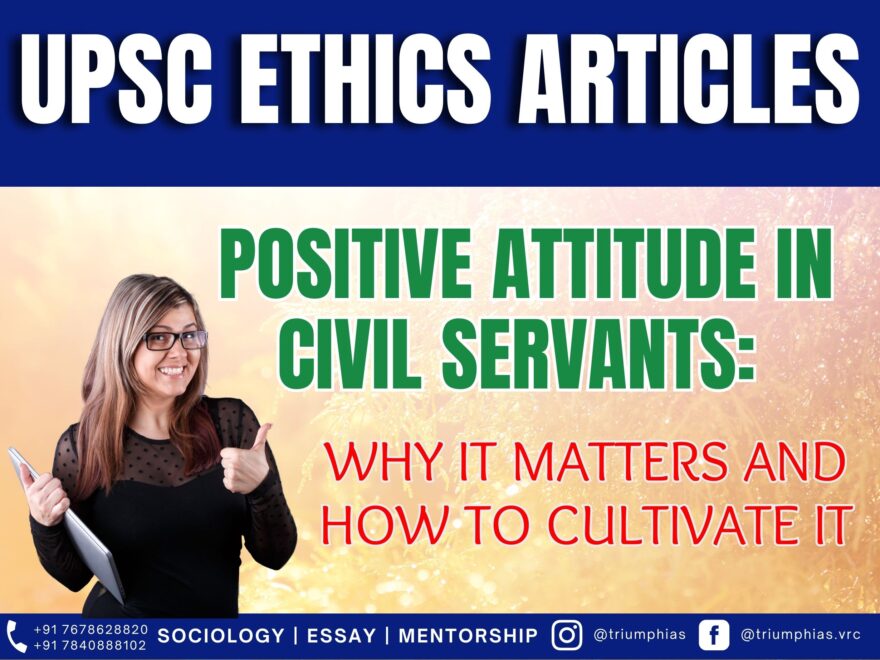Positive attitude and contribution to civil servant
(Relevant for Ethics, Integrity and Aptitude)

Positive Attitude
A positive mindset entails having a favorable perspective on oneself, others, and various circumstances. It empowers individuals to manage obstacles, surmount challenges, and attain objectives. For civil servants, cultivating a positive attitude holds particular significance as they navigate intricate issues, engage with diverse stakeholders, and strive to meet public expectations.
Positive Attitude can Help Civil Servants under Extreme Stress:
- Emotional Well-being: Maintaining emotional equilibrium, civil servants can adeptly manage their emotions, thwart burnout, and sustain their mental health. By emphasizing the positive facets of their roles and uncovering purpose in their service, civil servants can uphold their drive and well-being amidst adversity.
- Problem-Solving and Adaptability: When confronted with obstacles, civil servants harboring a positive perspective are more inclined to tackle issues with a forward-thinking and solution-driven approach. They possess the ability to conceive innovative ideas, recognize alternate strategies, and flexibly navigate shifting scenarios, resulting in more adept decision-making and adept problem resolution.
- Collaboration and Support: Civil servants fostering a positive mindset tend to foster robust connections, proactively seek assistance when needed, and offer aid to colleagues. This establishes a framework of mutual aid, permitting civil servants to collectively manage stress, exchange insights, and collectively navigate intricate situations.
- Communication and Leadership: Civil servants upholding an optimistic stance can effectively convey messages even during high-pressure instances, evoking assurance and stimulating their peers. They can cultivate a positive work atmosphere through endorsing candid conversations, active listening, and constructive input, thereby bolstering teamwork and elevating overall efficiency.
Factors that contribute to a positive attitude in a person are:
- Self-awareness: Individuals who possess an understanding of their strengths, weaknesses, values, and emotions can develop a pragmatic and well-rounded self-perception.
- Optimism: Those who embrace optimism have the capacity to recognize the positive facets of any scenario, anticipate favorable outcomes, and concentrate on solutions rather than challenges.
- Resilience: Individuals with resilience demonstrate the ability to rebound from setbacks, acclimate to evolving circumstances, and effectively manage stress.
- Gratitude: People who express gratitude can acknowledge and cherish life’s blessings, including health, family, friends, nature, and accomplishments. This can aid them in nurturing a sense of joy, contentment, and fulfillment.
- Empathy: Individuals who display empathy can comprehend and share the emotions of others, honor their viewpoints, and offer compassion. This can facilitate the development of trust, rapport, and collaboration with others.
A positive attitude is a valuable asset for a civil servant as it can enhance his or her performance, morale and public service. A positive attitude can be developed and nurtured by cultivating self-awareness, optimism, resilience, gratitude and empathy.
To master these intricacies and fare well in the Sociology Optional Syllabus, aspiring sociologists might benefit from guidance by the Best Sociology Optional Teacher and participation in the Best Sociology Optional Coaching. These avenues provide comprehensive assistance, ensuring a solid understanding of sociology’s diverse methodologies and techniques.
Best Sociology Optional Teacher, Best Sociology Optional Coaching, Sociology Optional Syllabus, Positive Attitude, Civil Service, Emotional Well-being, Problem-Solving, Adaptability, Collaboration, Communication, Leadership, Self-awareness, Optimism, Resilience, Gratitude, Empathy, Positive Attitude, Civil Service, Positive Attitude, Civil Service, Positive Attitude, Civil Service, Positive Attitude, Civil Service.
Choose The Best Sociology Optional Teacher for IAS Preparation?
At the beginning of the journey for Civil Services Examination preparation, many students face a pivotal decision – selecting their optional subject. Questions such as “which optional subject is the best?” and “which optional subject is the most scoring?” frequently come to mind. Choosing the right optional subject, like choosing the best sociology optional teacher, is a subjective yet vital step that requires a thoughtful decision based on facts. A misstep in this crucial decision can indeed prove disastrous.
Ever since the exam pattern was revamped in 2013, the UPSC has eliminated the need for a second optional subject. Now, candidates have to choose only one optional subject for the UPSC Mains, which has two papers of 250 marks each. One of the compelling choices for many has been the sociology optional. However, it’s strongly advised to decide on your optional subject for mains well ahead of time to get sufficient time to complete the syllabus. After all, most students score similarly in General Studies Papers; it’s the score in the optional subject & essay that contributes significantly to the final selection.
“A sound strategy does not rely solely on the popular
Opinion of toppers or famous YouTubers cum teachers.”
It requires understanding one’s ability, interest, and the relevance of the subject, not just for the exam but also for life in general. Hence, when selecting the best sociology teacher, one must consider the usefulness of sociology optional coaching in General Studies, Essay, and Personality Test.
The choice of the optional subject should be based on objective criteria, such as the nature, scope, and size of the syllabus, uniformity and stability in the question pattern, relevance of the syllabic content in daily life in society, and the availability of study material and guidance. For example, choosing the best sociology optional coaching can ensure access to top-quality study materials and experienced teachers. Always remember, the approach of the UPSC optional subject differs from your academic studies of subjects. Therefore, before settling for sociology optional, you need to analyze the syllabus, previous years’ pattern, subject requirements (be it ideal, visionary, numerical, conceptual theoretical), and your comfort level with the subject.
This decision marks a critical point in your UPSC – CSE journey, potentially determining your success in a career in IAS/Civil Services. Therefore, it’s crucial to choose wisely, whether it’s the optional subject or the best sociology optional teacher. Always base your decision on accurate facts, and never let your emotional biases guide your choices. After all, the search for the best sociology optional coaching is about finding the perfect fit for your unique academic needs and aspirations.
To master these intricacies and fare well in the Sociology Optional Syllabus, aspiring sociologists might benefit from guidance by the Best Sociology Optional Teacher and participation in the Best Sociology Optional Coaching. These avenues provide comprehensive assistance, ensuring a solid understanding of sociology’s diverse methodologies and techniques. Sociology, Social theory, Best Sociology Optional Teacher, Best Sociology Optional Coaching, Sociology Optional Syllabus.
Best Sociology Optional Teacher, Sociology Syllabus, Sociology Optional, Sociology Optional Coaching, Best Sociology Optional Coaching, Best Sociology Teacher, Sociology Course, Sociology Teacher, Sociology Foundation, Sociology Foundation Course, Sociology Optional UPSC, Sociology for IAS,
Follow us :
🔎 https://www.instagram.com/triumphias
🔎https://www.youtube.com/c/TriumphIAS
https://t.me/VikashRanjanSociology
Find More Blogs
|
Scope of the subject and comparison with other social sciences |
|||
|
|
|
|
Modernity and social changes in Europe |


One comment